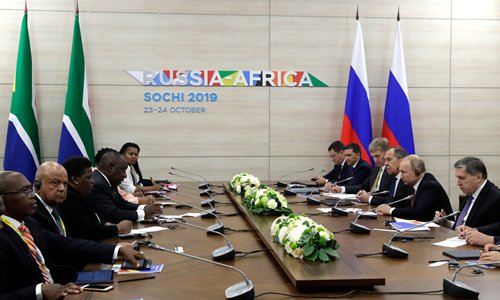HOME >> OPINION
Russia seeks to spread footprint in Africa
By Cui Heng Source:Global Times Published: 2019/11/8 23:18:43

Photo: IC
The first Russia-Africa Summit in Sochi, which "opened up a new page in the history of Russia's relations with African countries" as President Vladimir Putin put it, signals a Russian policy shift toward Africa and the Kremlin's bid to rebuild its Soviet-era influence in the continent. The summit, which took place on October 23 and 24, is the largest collaboration between Russia and African countries since the disintegration of the Soviet Union.
As Russia experienced a severe economic recession after the Ukraine crisis, international academic circles were quick to write it off — saying Moscow had lost its basic strength as a world power. But that doesn't seem to be the case, for the Sochi summit has not only displayed Russia's control on the Middle East but also demonstrated its international appeal. Representatives of 54 African countries came to the Sochi summit, 43 of whom were heads of state or government. Such support shows that African countries highly value Russia's international status, and Moscow is still a major power with global influence like Beijing and Washington.
The Sochi summit signaled Russia's ambitions to rebuild its Soviet-era influence in Africa, though it is now more focused on the economic benefits of cooperating with African countries. VTB Bank Chairman Andrei Kostin has called for cooperation between Russia and African countries, meaning Moscow can expand its international influence without putting the economy of the country into peril. Such consideration is based on the experience of the Soviet Union, which spent a lot of money to support African independence and increase its influence.
Influenced by Moscow's vision, African countries would sell natural resources and precious metals to Russia, so as to earn rubles to repay Russia's loans. Africans on the other hand could purchase Russian-made machinery, chemicals and weapons. This would benefit Russia, for it could gain political clout while increasing its support among African countries. At the same time, the cooperation could help find new export markets for Russian-made products and nuclear energy technology, and enable Moscow to train a new generation of industrial and technological manpower. In such transactions, ruble would be used as the settlement currency, which will undoubtedly help expand its influence as the international settlement currency. Significantly, the mutual cooperation is also beneficial to African countries which look forward to technology transfer crucial for their sovereignty and economic independence.
At the Sochi summit, Russia stressed that the current trade volume between Russia and African countries was only $20 billion, and Moscow would seek to "double this trade". Since Egypt's trade with Russia now accounts for 40 percent of that between Russia and African countries, the North African nation occupies the most important position. According to the Egypt State Information Service, the Russian Industrial Zone project in the Suez Canal Economic Zone is Russia's first offshore project, with the Russian investment in infrastructure amounting to $190 million. In addition, Russia and Ethiopia signed on the sidelines of the first Russia-Africa Summit an intergovernmental agreement on cooperation in the use of nuclear energy for peaceful purposes. Putin also held talks with the Namibian President on plans for cooperation in uranium mining and joint exploration of minerals potentially rich in copper, gold, diamonds and vanadium. Ugandan President Yoweri Museveni expressed hopes to purchase more tanks, aircrafts and other weapons from Russia.
Another advantage of Russia's expanding influence in Africa lies in the Soviet cultivation of a large number of African elites friendly to Russia. Many African leaders have been educated in the Soviet Union, and remain in high positions to this day, including former Namibian President Pohamba, former Chad Prime Minister Abbas and former Tanzanian Vice President Shein. Besides, African students can receive scholarships directly from the Russian government, or from large Russian companies such as Rusal or Rosneft who would hire these students in their African branches after graduation.
It can be seen that Russia is implementing an ambitious African policy and desires to re-establish a strong influence on African countries. However, the cooperation based on realism is more important for Russia's interests, which is completely different from the aid model during Soviet times. Although in the initial stages mutually beneficial cooperation will yield slower results than the aid model, bilateral cooperation based on mutual benefits is more conducive to long-term ties.
The author is a post-doctorate researcher from the Centre for Russian Studies, East China Normal University. opinion@globaltimes.com.cn
Newspaper headline: Sochi summit shows Russia’s intention of reviving influence in Africa
Posted in: VIEWPOINT